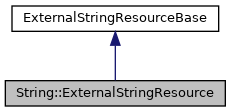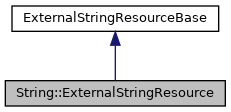#include <v8-primitive.h>
An ExternalStringResource is a wrapper around a two-byte string buffer that resides outside V8's heap. Implement an ExternalStringResource to manage the life cycle of the underlying buffer. Note that the string data must be immutable.
Definition at line 281 of file v8-primitive.h.
◆ ~ExternalStringResource()
Override the destructor to manage the life cycle of the underlying buffer.
◆ ExternalStringResource()
◆ cached_data()
| const uint16_t* cached_data |
( |
| ) |
const |
|
inline |
◆ data()
| virtual const uint16_t* data |
( |
| ) |
const |
|
pure virtual |
The string data from the underlying buffer. If the resource is cacheable then data() must return the same value for all invocations.
◆ length()
| virtual size_t length |
( |
| ) |
const |
|
pure virtual |
The length of the string. That is, the number of two-byte characters.
◆ UpdateDataCache()
Update {cached_data_} with the data from the underlying buffer. This can be called only for cacheable resources.
The documentation for this class was generated from the following file:




 Public Member Functions inherited from String::ExternalStringResourceBase
Public Member Functions inherited from String::ExternalStringResourceBase Protected Member Functions inherited from String::ExternalStringResourceBase
Protected Member Functions inherited from String::ExternalStringResourceBase